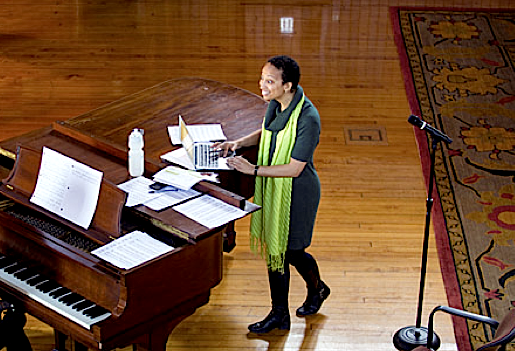Tsitsi Jaji among 'Seven New Generation African Poets'

Recently Aldon Nielsen noted that the choice made by Kwami Dawes and Chris Abani to include Tsitsi Jaji’s Carnaval in the box-set edition of Seven New Generation African Poets (Slapering Hol Press, African Poetry Book Fund; 2014) indicated that she has joined “the burgeoning number of poet-critics who are now working in our best universities . . . who are doing some of the most memorable work both as scholars and as poets.” Indeed, the concerns of the poems in Carnaval are the concerns of Jaji's recent critical book, Africa in Stereo. The poem “Preambule” is written across the Zimbabwean ground (“lightly / loosening the soil’s death rattle”) as its theory of listening derives from a transnational circulation of classical music (lines inspired by Schumann’s Carnaval, Op. 9, which the poet herself has performed), African-American double consciousness (W.E.B. DuBois) and musicological migration (“The piano originated in Africa,” per Abdullah Ibrahim). Another poem in Carnaval, “Arlequin,” doesn’t merely take Picasso’s primitivist modernism to task; it freely inscribes modernist lines, takes pleasure in an Africanized version of the harlequin’s role, and ends with voices of  doubly mocked vernacular. “Pierrot” theorizes stock character similarly, a slight-seeming yet significant intervention in the politics of rhetoric of a place where terrestrial nature seeks to ridicule or inhibit anything but the poetry of description. But this book is not the poetry of description. A Western art-historical tradition is submitted to “the / smear campaign of silt” and we realize — of this poem but really of the whole work — that as Pierrot becomes the alter-ego of the alienated artist, lapsing into mutism in a Euro-modernist dead end, the African poem can go on speaking through that campaign, “a limpid ripple” and producing “Light.” “Family Trees” is a prose-poem presenting a convergence of specific familial Zimbabwean relationships and the concept of the fatedness of relation. Father’s skin’s scars relate to mother’s easy surface bruising. Daughter is “equally flammable” but not only because she is her mother’s child and seems to play the mother’s “skin game,” but also because father’s scars derive from a traumatic immolation — not, in other words, the result of genetic fate but from the half-volition of an uncle. This leads to the natural linguistic re-gendering of “father woman,” an aunt who carries trauma as deep memory, a re-membering of her own “pendulated body.”
doubly mocked vernacular. “Pierrot” theorizes stock character similarly, a slight-seeming yet significant intervention in the politics of rhetoric of a place where terrestrial nature seeks to ridicule or inhibit anything but the poetry of description. But this book is not the poetry of description. A Western art-historical tradition is submitted to “the / smear campaign of silt” and we realize — of this poem but really of the whole work — that as Pierrot becomes the alter-ego of the alienated artist, lapsing into mutism in a Euro-modernist dead end, the African poem can go on speaking through that campaign, “a limpid ripple” and producing “Light.” “Family Trees” is a prose-poem presenting a convergence of specific familial Zimbabwean relationships and the concept of the fatedness of relation. Father’s skin’s scars relate to mother’s easy surface bruising. Daughter is “equally flammable” but not only because she is her mother’s child and seems to play the mother’s “skin game,” but also because father’s scars derive from a traumatic immolation — not, in other words, the result of genetic fate but from the half-volition of an uncle. This leads to the natural linguistic re-gendering of “father woman,” an aunt who carries trauma as deep memory, a re-membering of her own “pendulated body.”
Tsitsi Jaji’s writing in Carnval asks this: What precisely is the connection between that which is handed down — which is, after all, another sort of pendulating, akin to “so much depends” in modern art — and that which is learned or written in the history of a global present deriving from local trauma whose traces are inscribed on the skin of the family? Nii Ayikwei Parkes reads “the smear campaign of silt” as political, and associates this kind of political analysis with the musicality of the language which, “while clothed in English, bristle[s] with the muscle of another tongue.”
Jaji's Carnval presents a theory of stereomodernist listening — what Parkes calls “an undercurrent of music” — “splinter[ing] the / joy that took me. Because it was not my own. // Listen! Listen!” What we hear constantly in Jaji’s verse are convergences of African and African American notions of musicality. Carnval is to be deemed part of that important overall project.